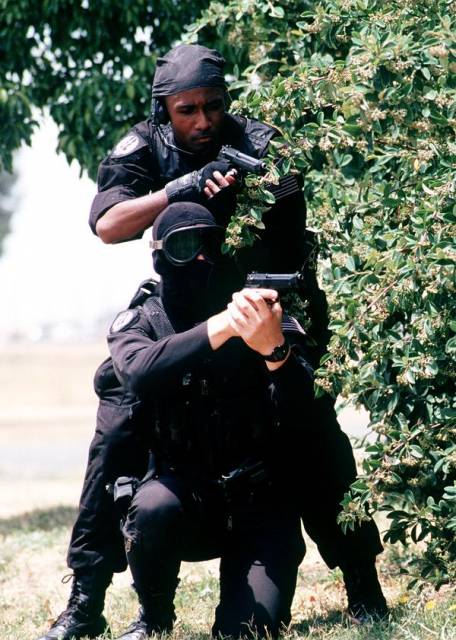In 1667 under the ruling of King Louis XIV in France, the first comparable police force to present day police, was created. Most police cite the Marine Police in London of 1800 which included the Glasgow and Napoleonic police of Paris as the first police force.
Uniformed Police
 Uniformed Police Officers
Uniformed Police OfficersUniformed police respond to emergencies and other incidents not including detective services. They wear uniforms and perform duties requiring the response of an officer's legal authority which includes traffic control, stopping and/or detaining motorists and crime response and prevention.
Police Detectives
Responsible for investigations as well as detective duties, detectives usually wear business attire due to a uniform being distracting or intimidating. Some cases require police to work undercover, where the identity of being a police officer is hidden in order to investigate crimes unsolved by other means. For the record, despite the running gag on Giant Bomb, an undercover police officer is not legally required to admit that they are a police officer under any circumstances, as this would defeat the purpose of going undercover in the first place.
Similarities with espionage can sometimes be found with police detective work. Detectives tend to investigate a crime after it has occurred, where patrol officers have already responded. Typically involving weeks or months until completion of their investigation, detectives will be spending most of their time in interviews and courtrooms.
Specialized Units
 Two S.W.A.T team officers
Two S.W.A.T team officersMany law enforcement organizations have a specialized preventive and detective group to deal with certain crimes or for situations that require certain skills, such as explosive device disposal (typically referred to as the "bomb squad").
Larger jurisdictions may have specially trained quasi-military units armed with military-grade weapons for the purposes of dealing with violent situations that would be beyond the capability of a patrol officers response. These units are typically known as S.W.A.T (Special Weapons and Tactics) team in the United States. Frequently involving the removal of innocent bystanders from dangerous people and dangerous situations, they are often equipped with non-lethal substances like chemical agents. In the United Nations, policing plays a very important role as international communities seek to develop the rule of law and reform security institutions in nations recovering from conflict.
Equipment
 Burgers are not typical police-issue.
Burgers are not typical police-issue.Many jurisdictions have police officers carry firearms, usually handguns, in the normal course of their duties. Special units usually handle armed offenders and similar dangerous situations.
Use of firearms or deadly force is typically a last resort only used when necessary to save a human life, only exempt for certain jurisdictions such as Brazil, which allows use against fleeing felons and escaped convicts. Police officers often carry handcuffs to restrain suspects. Modern police forces use radio communication as their primary source of communicating to coordinate their work, share information and get help quickly. Flashlights/torches, whistles and police ticket books or citations are also common police equipment.
Police Vehicles
 A police car.
A police car.Usually marked with appropriate logos and equipped with sirens and light bars to aid in making others aware of their presence. They are used for detaining, patrolling and transporting. Unmarked vehicles are primarily used for sting operations or apprehending criminals without alerting them to their presence. Specialty vehicles used include helicopters, watercraft, command post, vans, trucks, all terrain vehicles, motorcycles and SWAT armored vehicles.
Regulations
 The motto.
The motto.Several nations have criminal procedure law has been developed to regulate officers discretion, so that they do not arbitrarily or unjustly exercise their powers of arrest, search and seizure and use of force. In the United States, police cannot hold criminal suspects for more than a reasonable amount of time, typically 72 hours, before arraignment, using torture to extract confessions, using excessive force to effect an arrest and searching suspects bodies of their homes without a warrant obtained upon a showing of probable cause. Deception for confessions is permitted, but not coercion, with a few exceptions such as disarming a suspect.
Although the motto of the police force is "To Protect and Serve," the United States Supreme Court has ruled numerous times since 1856 that law enforcement officers have no duty to protect any individual, but instead to enforce the law in general.
There are Federal Law Enforcement agencies in the United States whose mission include providing protection for executives such as the President and accompanying family members, such agencies include the United States Secret Service.
Log in to comment